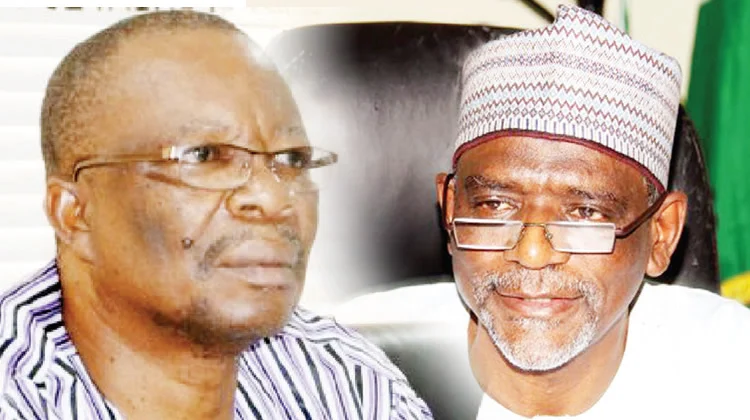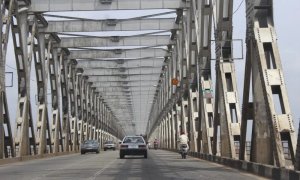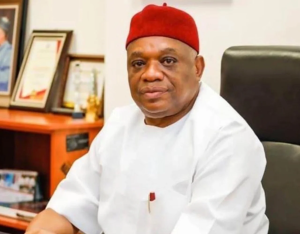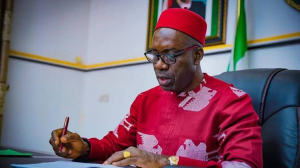
By DEBORAH TOLU-KOLAWOLE and DANIEL AYANTOYE
•Senior profs to earn N9m yearly, junior lecturers get N90,000 monthly
The offer made by the Federal Government to lecturers under the aegis of the Academic Staff Union of Universities may lead to a reduction in the salaries of entry level lecturers under the graduate assistant cadre, investigations by Sunday PUNCH have revealed.
Our correspondent also gathered that the Federal Government’s offer had been rejected by the majority of ASUU members, who had held their zonal congresses.
The PUNCH had earlier reported that the union leaders met with the Emeritus Professor Nimi-Briggs committee last Tuesday.
ASUU’s President, Prof Emmanuel Osodeke, while refusing to go into details of the discussion with the government, however, described the proposal as a “miserable offer.”
ASUU had on Monday, February 14, 2022 announced the commencement of a strike due to what it described as “failure” on the part of the government to meet some of the lingering demands of the union.
The union had cited the failure of the government to release revitalisation funds for universities; non-release of earned allowances to lecturers; end the proliferation of universities by politicians and state governments; refusal to deploy the University Transparency Accountability System for the payment of salaries and allowances of lecturers; and refusal to renegotiate the ASUU-FGN 2009 agreement as reasons for its present strike.
In a bid to resolve the strike and other contentious issues, the government had raised a panel led by the pro-chancellor of the Federal University Lokoja, Emeritus Prof Nimi-Briggs, to head its negotiation team with ASUU..
The Minister of Education, Adamu Adamu, while briefing State House correspondent last Thursday, noted that the failure of the government to agree to the payment of six months arrears of salaries of the lecturers was stalling the strike’s call-off.
According to Adamu, ASUU insisted on its members receiving salaries for the period they have been on strike.
However, sources in the union, who confided in our correspondent and were privy to the negotiations, explained that ASUU refused to resume further talks because of “a Greek gift.”
One of the sources, who confided in one of our correspondents on Saturday, noted that while there would be a “meagre” increase in the salaries of professors, there would be a deduction in the take home pay of graduate assistants.
The source explained, “For graduate assistants, the government proposed N1m per annum for starters, while senior graduate assistants will get N1.2m per annum and by the time the necessary deductions will be made in terms of pension, tax and others, some of them may be going home with less than N90,000 monthly.
“At the moment, graduate assistants on step four earn N1,606,380, while they get N133,865.08 as gross monthly salary, and by the time you deduct N3,346.63 National Housing Fund contribution, N10,039.88 as pension and N8,555.83 as tax, the person goes home with N111,922.74.
Meanwhile, the National Association of Nigerian Students has urged the striking lecturers under the aegis of ASUU to call off the strike.
Speaking on Channels Television’s Sunrise Daily on Friday, ASUU President, Prof Emmanuel Osodeke, stressed that the backlog of salaries must be cleared before lecturers would return to the classroom.
He said, “If we agree on that, therefore, the lectures we should have given to students for 2020/2021 and 2021/2022 sessions should be allowed to go, so we start a new session for 2022/2023 in September.
“Therefore, by July next year, I will go on my leave as we used to have in those days so that the backlog is gone. All the lectures that remain, all the two sets of admissions that JAMB has given that are waiting should become irrelevant.
“Other unions go on strike and come back, all those periods for which you are on strike, you don’t need to do the backlog of work.
“But for ASUU, when we go back today, we are going to start from the 2020/2021 session. For these two sets of students that have been admitted by JAMB, we have to teach them over these periods to ensure that we meet up with the system.
“So, we are going to do the backlog of the work we have left behind. We are not going to start today and say, ‘This session is 2022/2023, therefore, all these two sets of people that have been admitted by JAMB are cancelled’. We have to take another admission for the 2023/2024 session.”
Speaking with one of our correspondents on Saturday, the NANS President, Sunday Asefon, enjoined the union to seek alternative means of resolving issues on payment of salary backlog.
He said, “To our lecturers, by now I think they have to be considerate. We are not saying they should forfeit their six months’ salaries that the Federal Government is saying it will not pay; what we are saying is that they should also have the interest of the students, who are still at home for over six months, at heart. They should consider us.
“They should shift ground at this level and find a means to pursue the struggle on their six-month backlog of salaries. Keeping us at home will not solve it.
“ASUU should not be keeping us at home because of the six months’ salaries that have not been paid, which the Federal Government is saying it is not paying and I know it will definitely pay it.
“ASUU should find other means of pursuing their issues. We are not saying all they are pursuing is not genuine but they should find other means to do so.”
SSANU, NASU strike
Meanwhile, the Senior Staff Association of Nigeria Universities and the Non-Academic Staff Union of Allied and Education Institutions, on Saturday, announced the suspension of their ongoing strike for a period of two months.
“To this end, we hereby inform you of a two-month window given to the government to actualise the agreements that have been reached. The two-month window is in the nature of a ceasefire and does not represent a closure on the industrial action.
“It is our sincere prayer, given the assurance made by the Honourable Minister of Education and our commitment to ensure an end to the ongoing impasse that the two-month opportunity will suffice for actions to be taken and the entire matter laid to rest.”
The unions had called for the renegotiation of the 2009 agreement, payment of earned allowances, freedom from the usurpation of non-academic career positions by vice-chancellors, the inclusion of university staff school in the university community, payment of minimum wage arrears, and funding of state universities.
A committee set up by the Federal Government and headed by Briggs had engaged in negotiations with the two unions.
It was gathered that the Executive Secretary of the National Universities Commission, Prof Abubakar Rasheed, was also in attendance at the meeting between the minister and the unions’ representatives.
Ibrahim told one of our correspondents, “We suspended the strike for a period of two months. This is to give the government a window of opportunity to meet all the demands. After the two months we will meet again and have a review.”
Though Ibrahim did not disclose the demands of the unions, which had been met, the Minister of Education noted that the government had reached agreements with all the university-based unions except ASUU, which he claimed requested the payment of the backlog of salaries.





